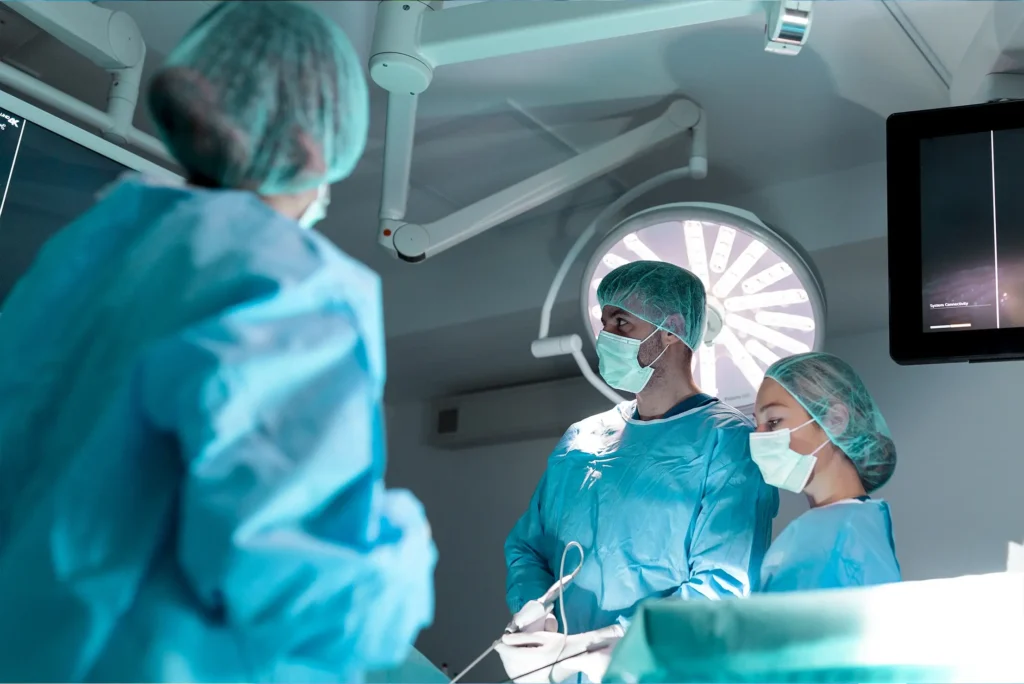Gastric Sleeve Surgery in Turkey
Losing weight and successful long-term weight loss maintenance can be very challenging in the management of obesity.
Gastric Sleeve Surgery is considered one of the most common, safe and effective solutions for losing weight as well as resolving obesity-related health conditions.
If you or a loved one have been struggling to lose weight through exercise or diet, despite multiple attempts, Gastric Sleeve in Turkey can provide an effective and long-term solution to achieve sustainable weight loss!
Average Length of Stay:
7 Nights
Operation Duration:
1-1.5 Hours
Anesthesia:
General
Recovery Duration:
7-10 Days
Expected Weight Loss:
80% of excess weight

What is Gastric Sleeve Surgery?
Gastric sleeve surgery (VSG) reduces the stomach by about two-thirds, leaving a small, banana-shaped portion. This limits how much you can eat, making you feel full with less food.
The surgery also impacts two hormones: ghrelin, the “hunger hormone,” and leptin, which regulates appetite.
By removing the part of the stomach that produces ghrelin, hunger is reduced. Leptin, produced in fat cells, helps control appetite and fat storage. After surgery, your body regulates leptin better, leading to reduced food intake and increased feelings of fullness.
How is Gastric Sleeve Surgery Performed?
Step-by-Step Surgical Process
1 Step: Preparation Phase
- Administering general anesthesia
- Making laparoscopic incisions and inserting the trocars
- Filling the abdomen with CO2 to lift the liver
2 Step: Main Surgical Phase
- Inserting a bougie tube to determine the new size of the stomach
- Dividing the stomach into two parts using a laparoscopic stapler
- Removing approximately 75-80% of the stomach
- Sealing the newly formed stomach pouch with staples
3 Step: Connection and Closure Phase
- Reinforcing the staple line with sutures
- Removing all surgical tools
- Closing the incisions with stitches
Please fill out the form to learn if you are a good candidate for weight loss surgery!
We are committed to protecting your privacy.
Who Qualifies for a Gastric Sleeve Surgery?
Individuals with a BMI of 40 kg/m² or higher, classified as class III obesity.
Individuals who have not been able to achieve satisfactory results in previous attempts to lose weight through other methods such as diet and exercise.
Individuals with a BMI of 35 or higher with at least one obesity-related health condition (comorbidity) such as Type 2 diabetes.
Individuals who are physically and mentally prepared for the surgery.
What are the Possible Complications or Risks of Gastric Sleeve Surgery?
Infection & Healing
- Infection
- Bleeding
- Blood clots
Breathing & Digestion
- Nausea & vomiting
- Heartburn
- Reflux
Structural & Surgical
- Staple line leakage
What are the Pros & Cons of Gastric Sleeve Surgery?
+PROS
- No intestinal bypass; the small intestine is left unchanged.
- The functions of the stomach are preserved, so most foods can be tolerated in smaller amounts.
- Less hunger sensation due to decreased appetite-stimulating Ghrelin levels.
- Improvement in many obesity-related conditions such as obstructive sleep apnea.
- The procedure can later be converted to gastric bypass if required or desired.
- Lower chance of developing ulcer due to less acid secretion.
- No risk of experiencing dumping syndrome.
-CONS
- Not reversible.
- Gastric sleeve surgery can cause or worsen acid reflux due to the increased pressure within the abdominal cavity. In the long term this can lead to gastroesophageal reflux disorder (GERD).
- As no intestinal bypass is done, it may take longer to reach your target weight.
- Rapid weight loss may increase the risk of gallstones.
Reasons to Choose Turkey for Gastric Sleeve Surgery
Geographic Location & Convenience
Turkey, a country that is strategically located at the meeting point of Asia, Europe and Africa, provides visa-free entry for 78 countries. Being only at a four-hour flight distance to around 1 billion people and 57 countries, the country offers flexible and budget-friendly travel options for medical tourists with minimum waiting times.
Exchange Rate
One of the reasons for the low treatment prices can be attributed to the Turkish economy. Currently one US Dollar is equivalent to 32,60 TRY, one Euro to 35,13 TRY and one Pound to 41,43 TRY. This implies that foreign medical tourists from the US, UK or other European countries can pay less for a gastric sleeve in Turkey, thanks to the cost savings achieved from currency exchange.
Highly Qualified Personnel
The number of hospitals and clinics can be high, but the regulations apply across every business. The strict medical regulations require every member of the medical team to hold a qualification to actively participate in a procedure. The low cost of labor in Turkey gives the hospitals and clinics a great advantage over its foreign competitors when determining the price of a gastric sleeve in Turkey.
All-Inclusive Treatment Packages
Tourists traveling to Turkey to undergo gastric sleeve surgery can take advantage of the all-inclusive packages offered by a high number of clinics/hospitals. The treatment package is designed to make your trip to Istanbul as stress-free as possible, including everything required for a comfortable stay!
Save up to 70% by undergoing Gastric Sleeve Surgery in Istanbul, Turkey!
The following table illustrates a cost comparison between Turkey and other countries:
Gastric Sleeve Surgery/All-Inclusive Package
- Preoperative examination and assessments
- All medications and 3-night hospital stay 4-night hotel stay with nursing care and broth service
- Airport-hotel-hospital transportation
- Dietitian support, follow-up, and nutrition plan
- Medical translator and online support group
What are the Pre-Op Preparations for Gastric Sleeve Surgery?
Here is a general overview of how to prepare for gastric sleeve surgery. It is important to follow these instructions in order to ensure everything goes smoothly on the day of the procedure. Guidelines that are required to be followed in advance of surgery include:

Before the Surgery
Dietary Restrictions
Remove Adornments
Stop Taking Supplements
Avoid Smoking
No Alcohol
Medication Management
Packing Essentials
Stop Taking Birth Control
The Day of Surgery
Dress Comfortably: On the day of the surgery, patients should wear loose-fitting clothing and comfortable shoes. This will help reduce discomfort after the surgery.
Final Preoperative Evaluation: Upon admission to the hospital, patients will undergo a final preoperative evaluation. This includes:
- Checking the heart rate, blood pressure, body temperature and breathing rate
- Measuring the weight
- Checking oxygen levels
- Attaching the IV (intravenous) drip
- Administering blood thinning medication
- Administering anesthesia

The operation generally takes between 60 to 90 minutes to complete but the total time the patient spends in the operating room can be around 2-3 hours. After the operation, the patient will be taken to the recovery room to be monitored.
Patients spend an average of two days in the hospital following gastric sleeve surgery. On the 3rd day, tests such as a gastrointestinal leak test will be conducted to make sure our patients are in good health. The patient can leave the hospital if there are no signs of any health issues or complications.
Gastric Sleeve Recovery/What to Expect After Gastric Sleeve Surgery
After undergoing gastric sleeve surgery, patients must be well-prepared for the recovery process. Here’s what to expect:
Postoperative Care and Pain Management
Before leaving the hospital, patients receive detailed postoperative care instructions and nutritional counseling. Pain following gastric sleeve surgery is usually manageable, but if intense pain occurs, the surgeon will prescribe painkillers. Walking as soon as possible is encouraged to prevent blood clots and support faster healing.
Early Recovery and Energy Levels
It’s normal to feel tired and exhausted in the first days after surgery, primarily due to the surgery itself and the reduced calorie intake from the liquid diet. As the body heals and energy levels rise, resting is important during this phase to aid recovery.
Dietary Guidelines and Stages
A dietician provides patients with specific guidelines on portion sizes and food types. The diet plan is divided into four stages: clear liquid, liquid, pureed-soft, and solid food. For the first 10 days, patients must follow a clear liquid diet to protect the stomach. Gradually introducing new foods through the stages helps the stomach heal fully within 2-3 months.
Returning to Work and Long-Term Results
Most patients can return to work within a week, though recovery times vary. By one month, most are fully recovered and able to resume normal activities. By following the surgeon’s and dietitian’s recommendations, patients can expect to lose up to 80% of their excess body weight within 2 years.
Frequently Asked Questions
What medical tests are done prior to gastric sleeve surgery?
Prior to surgery we perform a general physical examination. First we carry out a complete blood count. We measure the levels of hormones, blood sugar and cholesterol. Additionally, we carry out further medical evaluations including cardiac and respiratory testing. An ultrasound of the abdomen, which is useful for finding gallstones and/or fluid around the abdominal organs and other anomalies. And most importantly an endoscopy as part of the pre-operative assessment.
How do you detect a leak after gastric sleeve surgery? How is the leak test performed?
On the morning of the third day following surgery, we have our patients swallow some liquid contrast dye and then take X-rays to see if the dye is leaking through the anastomosis. In the following days we continue to monitor our patients and check if they have developed any symptoms such as increased heart rate or fever.
When does weight loss come to a stop after gastric sleeve surgery?
Most patients experience weight loss within the first 15 to 18 months following gastric sleeve surgery. After 18 months the rate of weight loss slows down as the body adjusts.
Who is not a good candidate for gastric sleeve surgery?
Individuals with schizophrenia or bipolar disorder, congestive heart failure or recently have had a heart attack and people who have autoimmune disorders do not qualify for gastric sleeve surgery.
Can the stomach be stretched after gastric sleeve surgery?
There are some post surgery guidelines that patients need to follow after gastric sleeve surgery. Patients following these guidelines will not have their stomachs stretched out. Patients who don’t follow the recommended guidelines may end up stretching out their stomachs, which, in the long-term can lead to weight gain as well as bad breath.
Please fill out the form to learn if you are a good candidate for weight loss surgery!
We are committed to protecting your privacy.





